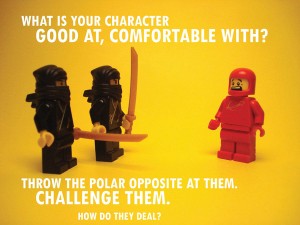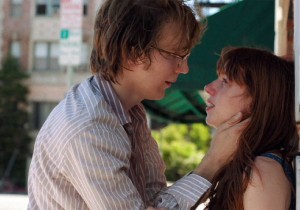Pixar’s Rules for Story-Telling — in Legos!
Posted on July 30, 2012 at 3:55 pm
 All movie fans and aspiring writers should be familiar with Pixar’s rules of story-telling, and Slackstory has delightfully illustrated twelve of them with Legos.
All movie fans and aspiring writers should be familiar with Pixar’s rules of story-telling, and Slackstory has delightfully illustrated twelve of them with Legos.
Posted on July 30, 2012 at 3:55 pm
 All movie fans and aspiring writers should be familiar with Pixar’s rules of story-telling, and Slackstory has delightfully illustrated twelve of them with Legos.
All movie fans and aspiring writers should be familiar with Pixar’s rules of story-telling, and Slackstory has delightfully illustrated twelve of them with Legos.
Posted on July 25, 2012 at 4:12 pm
One of Hollywood’s most distinguished and influential writers, Frank Pierson, died this week at age 87. He won an Oscar for “Dog Day Afternoon,” and was nominated for the comic western “Cat Ballou.” The American Film Institute included his line of dialogue as 11th on their all-time great list: “What we have here is a failure to communicate.” Pierson also served as the President of the Academy of Motion Picture Arts and Sciences and was a devoted mentor to aspiring screeenwriters.
The New York Times obituary has a telling story about his work on “Dog Day Afternoon” that sheds light on his exceptional insight and character:
Mr. Pierson said he struggled mightily with that script — and he later used his struggle as a teaching tool. He told students that he had been unable to capture the essence of the central character, the leader of an inept gang of bank robbers who winds up taking hostages.
He broke through after concluding that the thief, based on a real-life robber and played by Al Pacino, was a pleaser, someone trying in his flawed way to make others happy.
I spoke to Mamie Mitchell, who worked with Pierson, and told me of his graciousness, generosity, and class. She said,
I had the great good fortune to edit the book A Nation Lost And Found: 1936 America Remembered by Ordinary and Extraordinary People
, for Frank Pierson and Stanley Sheinbaum, in 2000-2002. At our first lunch meeting to discuss the overview of the book, I took the opportunity to ask Frank who he thought were the best screenwriters in Hollywood. Mind you this was summer 2000. He said, “Aaron Sorkin, David Milch….there are many good screenwriters, the problem is that there are hardly any people left in Hollywood that can recognize good writing”.
Frank had great hope and passion for this book….unfortunately 9/11 coincided with the release of “A Nation Lost and Found” and it was glossed over. In this current time in the history of our country, it would be wise reading to reflect back on 1936 and the resilience, engagement, awareness and perseverance of the people at that time. The book holds up.
Posted on July 25, 2012 at 8:00 am
Zoe Kazan, the grand-daughter of legendary director Elia Kazan (“On the Waterfront”) and the daughter of two writers, has made a strong impression in small roles opposite Meryl Streep (“It’s Complicated”) and Leonardo DiCaprio (“Revolutionary Road”). Her boyfriend is Paul Dano, whose performances in films like “There Will be Blood” and “Little Miss Sunshine” have earned him the reputation of one of the most thoughtful actors of his generation. Kazan wrote and produced “Ruby Sparks” and they appear in it together. Dano plays an acclaimed young writer who is struggling to follow his successful first book and is stunned and then captivated when the young woman he creates with his typewriter comes to life.
Did you know when you wrote the script that you would be playing the title character?
Kazan: Well, it wasn’t the title character when I wrote the script – that happened in retrospect, but yeah – I had a sort of flash of inspiration, not unlike Calvin . I had a dream and I woke up in the morning and the scenes of this movie were in my head and I wrote it down as fast as I could so I wouldn’t lose it and then showed those five or 10 pages to Paul and he said “you’re writing this for us, right?” It really hadn’t to occurred to me – and then it was completely obvious to me that that was what I was doing – so from that point on I knew I was writing for myself and I think it was…they were just such clear people to me that I didn’t think too much about us. It wasn’t until later when I was actually having to do it that I said “oh God, what have I written?” For so long, I was just thinking about it as a writer but it wasn’t until the very last month of preparation that I even started thinking about acting it.
Both of them are really acting-challenge roles – people don’t like to play writers because they are sitting and looking at a piece of paper, and a lot of it is very internal.
Dano: Well, you just sort of take the basic building blocks that the script gives you. In this case he’s gotten out of a long relationship, he does not have any friends—his brother, rather, is his only friend, he lives in a big house alone, he got a dog to try and help them meet people but that doesn’t seem to be working out, his father has passed away, and he’s had a huge success that he cannot follow up and has writer’s block and so those are all just great, great, great starting points to sort of then figure out, “okay, how do you feel about those things?” Because each of those is a big thing and a big feeling and you can start to figure out what happened before that, especially with his book and how he got into writing and what his relationship maybe with his father was like and with the ex-girlfriend– you just sort of build it up but you start with what’s on the page that’s given to you and then you just sort of fill in the blanks.
And Zoe, your character was almost like an acting exercise, somebody throwing things at you, ”now be this, and now be that.” How do you create a character, that is, when you’re playing something so changeable?
Kazan: Well, you know, the main thing that Jonathan and Valerie and I talked about in the writing and then in the playing of her was that we wanted her to feel very real, and we never wanted her to feel like a fantasy or like the idea of a person. It was sort of like doing my preparation, like, “who is Ruby?” and finding things out about her as I wrote. She’s a very forthright person, and she’s sort of a person in charge of her own desires, she knows what she wants and she’s more straightforward than I am as a person, and there was some surprise in that, especially when you started playing it in her rehearsal—where she lived, where her voice is where her energy is, she’s very front foot, very forward and I think a little more cat-like than dog-like. So, a part of it was just moving away from the writer’s head, which was all about the story and how these people interact and then moving into my body and then feeling who she was physically. That was a real moment of discovery for me, which I wasn’t anticipating, because I sort of thought writing it, I would know everything, but I learned a lot just within the first week when we were rehearsing. The important thing for me with the changes that happened to Ruby me was that they feel like a related person but not the same – he’s changing her, he’s bringing out a different side of her, so, those things were fun to play because they were like an exaggerated quality. But you know, we were always trying to keep it grounded in reality.
Posted on July 2, 2012 at 8:00 am
We all mourn the loss of the warm, wise, and witty writer/director Nora Ephron. As Adam Bernstein noted in his perceptive obituary for the Washington Post, she was always guided by the advice of her screenwriter parents to “take notes — everything is copy.” Bernstein describes her
razor-sharp self-awareness and the ambition to transform workaday absurdities, cultural idiosyncrasies, romantic foibles and even marital calamity into essays, novels and films brimming with invitingly mordant wit. She credited her mother with bestowing “this kind of terrific ability, not to avoid pain but to turn it over and recycle it as soon as possible.”
I first became of fan of Ephron through the columns she wrote about journalism (collected in Scribble Scribble) and women (collected in Crazy Salad: Some Things About Women), which were enormously influential for me in both form and voice. Slate Magazine’s wonderful “Dear Prudence” columnist, Emily Yoffe, wrote about how she was inspired and influenced by Ephron‘s “inimitable voice: sly, dry, witty, devastating, personal, hilarious.”
She is remembered for her romantic comedies, especially the classics “When Harry Met Sally….,” which she wrote, and “Sleepless in Seattle” and “You’ve Got Mail,” which she wrote and directed. But she also co-wrote the powerful and evocative drama, Silkwood. She took the most painful experience of her life, discovering that her husband was unfaithful to her when she was seven months pregnant with their second child, and followed her parents advice, turning it into the trenchantly funny novel and then movie Heartburn. Two of her films that I especially love are My Blue Heaven (I think it is adorable that she wrote a witty witness protection program romantic comedy as her husband’s non-fiction book was being turned in to the witness protection program drama “Goodfellas”) and “This is My Life,” with Julie Kavner as a single mother and stand-up comic struggling with life/work balance. She loved food (even included recipes in Heartburn), not surprising as her work was just plain tasty.
She has inspired some magnificent tributes, including Indiwire’s list of 10 of her best lines and this gorgeous piece by Lena Dunham of “Girls” that says so much about her wisdom and generosity — and the legacy of writers she inspired to find and own their voices. I loved the echo of “take notes” in her comforting response to Dunham’s failed brownies. Tom Hanks, who starred in her two best-loved films, wrote a warm and perceptive appreciation in Time Magazine, noting her insistance on telling details and distinctive voice. The producers of Ephron’s forthcoming Broadway show have promised the show will open, so we all have one more treat to look forward to. Celebrate Nora Ephron by sharing your favorite Ephron book or movie with someone you love. May her memory be a blessing.
Posted on June 29, 2012 at 3:50 pm
 In Woody Allen’s new film, To Rome With Love, characters describe an “Ozymandian melancholy.” That is a reference to the poem “Ozymandias” by Percy Bysshe Shelley. It is the story of a man who describes an enormous ancient statue that is all broken and decayed. Hundreds, maybe thousands of years before, an arrogant king had the statue erected to show that his power and fame would never die. But today, he is not even remembered. The “Ozymandian melancholy” refers to the sense that all accomplishment, all happiness, all existence is fleeting. Setting the film in a city that is filled with ancient artifacts underscores this theme.
In Woody Allen’s new film, To Rome With Love, characters describe an “Ozymandian melancholy.” That is a reference to the poem “Ozymandias” by Percy Bysshe Shelley. It is the story of a man who describes an enormous ancient statue that is all broken and decayed. Hundreds, maybe thousands of years before, an arrogant king had the statue erected to show that his power and fame would never die. But today, he is not even remembered. The “Ozymandian melancholy” refers to the sense that all accomplishment, all happiness, all existence is fleeting. Setting the film in a city that is filled with ancient artifacts underscores this theme.
I met a traveler from an antique land
Who said: Two vast and trunkless legs of stone
Stand in the desert. Near them, on the sand,
Half sunk, a shattered visage lies, whose frown,
And wrinkled lip, and sneer of cold command,
Tell that its sculptor well those passions read
Which yet survive, stamped on these lifeless things,
The hand that mocked them, and the heart that fed;
And on the pedestal these words appear:
“My name is Ozymandias, king of kings:
Look on my works, ye Mighty, and despair!”
Nothing beside remains. Round the decay
Of that colossal wreck, boundless and bare
The lone and level sands stretch far away.